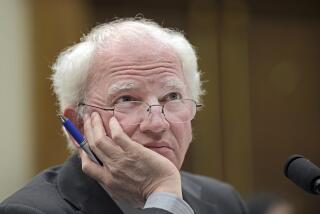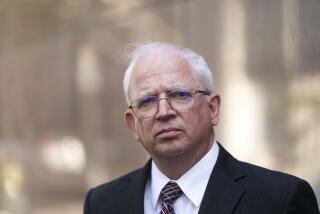Judge Raymond Kethledge from Michigan balances courtroom with solitude and nature
Judge Raymond M. Kethledge from Michigan is among the least known of President Trump’s final four candidates for the Supreme Court, and that could become an advantage in the confirmation process.
Kethledge is a solid conservative and a Washington outsider. He likes to fish and hunt, and he says he does much of his work in a barn office in northern Michigan which has no internet connection and is heated only by a wood stove.
The 51-year old judge is co-author of a new book, “Lead Yourself First,” that focuses on the value of solitude and meditation. He espouses the importance of being alone and having time, uninterrupted, just to think.
He has also spoken out about the need for greater civility in the legal profession, warning lawyers against arrogance.
He was once a law clerk at the Supreme Court for Justice Anthony M. Kennedy whose seat he could fill, and he has a decade-long record of conservative rulings for the U.S. Court of Appeals for the 6th Circuit, based in Cincinnati.
RELATED: Trump may pick one of these judges for Supreme Court today »
He has degrees from the University of Michigan and its law school, and he returned there to live in Ann Arbor after his brief period of working at the high court and as a Senate staffer.
His distance from Washington and his relatively low profile could help him win the nomination. Conservative columnist Hugh Hewitt touted him in the Washington Post last week as “a staunch originalist from the heartland…. Imagine Sen. Jon Tester [D-Mont.] or Sen. Heidi Heitkamp [D-N.D.] explaining to their voters this fall why they voted against an honest-to-God outdoorsman.”
Former Republican Sen. Spencer Abraham of Michigan, who had employed a young Kethledge, emphasized the nominee’s outdoor adventures in a recent review of his book. “I do know he has tracked game through the Michigan wilderness, pulled salmon out of the St. Mary’s River and battled swells in his aluminum fishing boat on Lake Huron.”
On the 6th Circuit Court, Kethledge has not been called upon to rule on the most contentious issues like abortion, and he was not on the 6th Circuit panel that ruled against same-sex marriages, a decision overturned by Kennedy and the Supreme Court.
But his blunt and plain-spoken opinions have won him admirers in conservative circles. In 2014, he spoke for the appeals court in tossing out a lawsuit brought by the U.S. Equal Employment Opportunity alleging that Kaplan, a private provider of higher education, used background checks that discriminated against African Americans. Kethledge took apart the government’s case piece-by-piece and concluded: “The EEOC brought this case on the basis of a homemade methodology, crafted by a witness with no particular expertise to craft it, administered by persons with no particular expertise to administer it, tested by no one, and accepted only by the witness himself.”
Last month, the Supreme Court reversed one of his rulings on cell-phone privacy. In a case called Carpenter vs. United States, Kethledge rejected the argument that allowing the government to collect 127 days of cellphone data tracking a user’s movements was an unreasonable search. “In 4th Amendment cases the Supreme Court has long recognized a distinction between the content of a communication and the information necessary to convey it. Content, per this distinction, is protected under the 4th Amendment, but routing information is not,” Kethledge said.
ACLU lawyers appealed and last month, Chief Justice John G. Roberts Jr. spoke for the court in reversing that decision and holding that police could not collect weeks worth of cellphone data without first obtaining a search warrant.
More stories from David G. Savage »
Twitter: DavidGSavage
More to Read
Get the L.A. Times Politics newsletter
Deeply reported insights into legislation, politics and policy from Sacramento, Washington and beyond. In your inbox three times per week.
You may occasionally receive promotional content from the Los Angeles Times.







